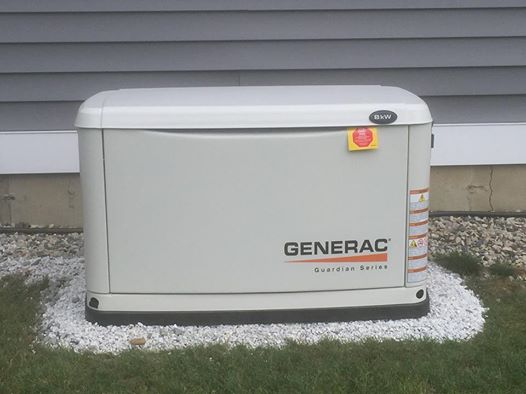All About Standby Generators
How To Size A Standby Generator
A qualified electrician can size your generator properly to service all the electrical items in your home, and there are ways of including large electrical loads by using a smart transfer switch.
In general, a 22kw standby generator is the typical sized generator for a home in the 2,500sqft or less size category. The 22kw generator is also the largest air-cooled and economical home generator. Anything more significant than this generator starts to come under the water-cooled and commercial application category.
Because some homes need more power than the 22kw generator can supply, especially with all the electrical items calling for power at the same time. Generac has designed a smart transfer switch that manages electrical loads so your whole house can be covered by either the maximum sized generator or if a smaller generator is installed for crucial electrical loads.
What Is The Cost Of A Whole-House Generator?
You can save some money by having a smaller generator installed that will do the same thing but uses the electrical power management system for optional loads.
The cost of having an automatic standby generator varies depending on your electrical service size. Some homes have a 100 amp service, with most new homes built today having a 200 amp service.
The electrical service determines the size of the transfer switch that is needed for your generator. The transfer switch has to match the size of your electrical service. So, a 200amp generator transfer switch is going to cost more than a 100amp generator transfer switch.
Then there is the actual size of the generator. Generac whole house generators range in size from 9kw to 22kw, so again the price range is dependent on what size generator is selected.
What Fuel Does A Generator Run On?
Another expense is the fuel to run the generator engine. Generac generators operate using natural gas and propane, so you need to have one of those fuels available at your home.
The best situation is if you have natural gas already at your home for heating and cooking. This way provides less actual work connecting the generator to the gas line, and most likely, the gas lines are large enough without any alterations to supply the generator.
If you don’t have natural gas or propane at your home, then this will be an expense to consider before purchasing a new automatic standby generator.
It’s more cost-effective to install propane tanks on your property than to dig up the street and bring gas to your home if you have natural gas at the road. It would make sense to have natural gas piped to your home if you are thinking of updating your heating and cooking to natural gas too.
The typical cost of installing a 9kw automatic standby generator varies from $4,800 to $6,000 depending on certain site conditions.
The typical cost of installing a 22kw automatic standby generator varies from $8,500 to $12,000 depending on certain site conditions.
What Is The Warranty On A Generac Generator?
Generac provides a standard five-year limited warranty with an optional seven-year extended warranty if desired.
How Long Will A Whole-House Generator Run?
An automatic standby generator will continue to operate as long as there is fuel supply. Obviously, running out of fuel is not a concern when it’s supplied by natural gas; however, there may be a concern if propane fuel is used.
Propane is kept in a tank that needs to be refilled, so you will want to be sure you have enough propane storage to outlast any prolonged power outage.
A 22kw Generac automatic standby generator uses approximately 2 gallons of propane per hour during operation under a 50% electrical load. Because an electrical outage could go for as long as 24 to 48 hours, it is recommended to have at least 200 pounds of propane for your standby generator.
In most cases, even during winter storms, the electrical power is restored, or propane is delivered before the generator is out of fuel during a power outage.
What Is The Common Cause Of Electrical Power Outages?
The most common cause of electrical power outages is done by high winds and storms consisting of ice and snow that pull down electrical lines along with downed trees and limbs.

